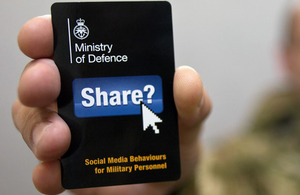Don't ignore internet safety rules
There are some very simple guidelines we can follow to protect ourselves when using the internet.

Find out more about online security at 'Think before you share online'
At the start of Get Safe Online Week, new research by not-for-profit organisation getsafeonline.org has revealed that, despite the fact that the vast majority of Brits (84%) recognise that it’s our own responsibility to be safe online, we are often not taking the most basic of precautions.
Because of the jobs they do, members of the Armed Forces community and defence civilians need to be particularly careful when they are online.
Not only do they have to make sure that they don’t share information they need to keep safe, but they also need to make sure they tell their friends and families to do the same thing.
People can find out more about online security for the defence community on the Think before you share online page of GOV.UK
Some of the biggest online safety sins involve passwords. In fact, almost half of the 2,000 UK adults surveyed (47%) don’t always log out of websites or apps when they’ve finished using them.
This is made worse by the fact that only 42% of adults use passwords or PINs on their mobiles. As mobile devices become more sophisticated, not protecting them with a password can be likened to leaving your keys in your front door; all of the contents are vulnerable to theft and huge bills could be run up in your name.
There are also other behavioural misdemeanours, particularly when it comes to using social media.
Personal Security Online 2: RAF, Friends & Family
For example, the survey found that nearly a third (31%) of social media users have accepted a friend they don’t know in real life, and a quarter (26%) regret something they have posted online.
Also, almost a third (31%) of Snapchat users do not filter their messages and will accept them from anyone, leaving them open to abuse or inappropriate content.
Security Minister James Brokenshire said:
Get Safe Online Week is a great opportunity to highlight some quick and easy steps people can take to ensure their online experience stays a positive one.
Alongside this practical advice we’ve launched the National Crime Agency and the National Cyber Crime Unit and taken the fight to the hackers, fraudsters and criminals who prey on innocent individuals.
People can get involved in Get Safe Online Week via Twitter @GetSafeOnline and Facebook (Get Safe Online) where experts will be on hand throughout the week to answer any questions and give advice on how to stay safe online.